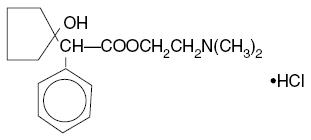AK-Pentolate
Generic name:cyclopentolate hydrochloride
Dosage form: ophthalmic solution
Drug class:Mydriatics
Medically reviewed by Drugs.com. Last updated on Feb 21, 2022.
On This Page
Rx only
AK-Pentolate Description
AK-Pentolate™ (Cyclopentolate Hydrochloride Ophthalmic Solution) is an anticholinergic prepared as a sterile, borate buffered solution for topical ocular use. It is supplied in two strengths.
Chemical name:
2-(Dimethylamino)ethyl 1-hydroxy-α-phenylcyclopentaneacetate hydrochloride
MW=327.85 C17H25NO3 • HCl
The active ingredient is represented by the structural formula:

AK-Pentolate™ (Cyclopentolate Hydrochloride Ophthalmic Solution) USP, 1% & 2%
Each mL contains: Active: Cyclopentolate Hydrochloride 10 mg (1%) or 20 mg (2%).
Preservative: Benzalkonium Chloride 0.1 mg (0.01%).
Inactives: Boric Acid, Edetate Disodium, Potassium Chloride (except 2% strength), Sodium Carbonate and/or Hydrochloric Acid may be added to adjust pH (3.0 to 5.5) and Purified Water USP.
AK-Pentolate - Clinical Pharmacology
This anticholinergic preparation blocks the responses of the sphincter muscle of the iris and the accommodative muscle of the ciliary body to cholinergic stimulation, producing pupillary dilation (mydriasis) and paralysis of accommodation (cycloplegia). It acts rapidly, but has a shorter duration than atropine. Maximal cycloplegia occurs within 25 to 75 minutes after instillation. Complete recovery of accommodation usually takes 6 to 24 hours. Complete recovery from mydriasis in some individuals may require several days. Heavily pigmented irides may require more doses than lightly pigmented irides.
Indications and Usage for AK-Pentolate
Cyclopentolate hydrochloride ophthalmic solution is used to produce mydriasis and cycloplegia.
Contraindications
AK-Pentolate™ (Cyclopentolate Hydrochloride Ophthalmic Solution) should not be used when untreated narrow-angle glaucoma, or untreated anatomically nar..



